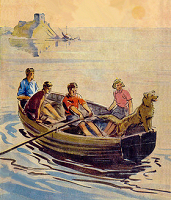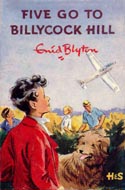
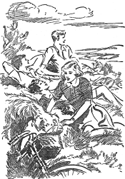
Ah, a perfect camp site halfway up Billycock Hill.
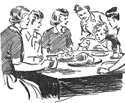
At the farm, the Five meet Toby, his little brother Benny, and Curly the piglet.
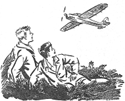
R-r-r-r-r-r-r-r! Golly! A plane from the secret airfield!
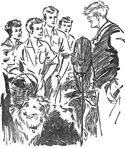
The Five meet Mr Gringle, the eccentric butterfly man.
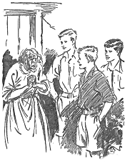
Is Old Mrs Janes a witch?
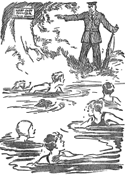
The children get into trouble when they go for a swim on private property.
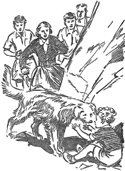
Benny goes missing—but Timmy finds him!

What's this? A message scribbled on Curly's back?

Uh-oh! That silly Curly has "runned away" again!
Five Go to Billycock Hill
Review by Keith Robinson (September 3, 2005)
Like the previous book, Five on a Secret Trail, the Five's sixteenth outing starts well but then sort of flounders about in a big swamp of blah. Frankly, I couldn't wait to get to the end of this one.
The Five decide to bike to Billycock Hill, where Julian and Dick's school friend Toby lives on a farm. Toby has all the camping equipment the Five will need, so they can camp high up on the hill overlooking the countryside—and a nearby secret airfield. The Five set off and travel six miles along country lanes before they stop for an ice cream. After ten minutes' rest they set off again and have lunch around one o'clock. Blyton is once more in her element describing the countryside along the way, and this is a very pleasant start to the book. The Five arrive at Billycock Farm before four o'clock, and Timmy—bless his little cotton socks—is tired out by now, having run alongside them all the way!
At the farm the Five meet Toby and his little brother Benny. Benny is a very funny, cute kid with a pet piglet called Curly. (A side note: in the 1970s Knight edition Curly is a pigling, but is a piglet in the 2005 Hodder edition. This is one of many changes I've noted between the two versions, some minor, some not-so-minor.) Toby starts out as a bit of a joker, using a fake spider to scare George and Anne out of their skins, and generally being a bit of a tease towards George (sometimes inadvertantly). He's very proud indeed to talk about his cousin Jeff, who's an RAF pilot working at the secret airfield nearby. And when cousin Jeff comes to visit one day, everyone is quite taken by him—even Timmy, who immediately offers his paw in greeting!
Before that, though, the Five set up camp on the hill, finding a perfectly lovely little spring of ice cold water and a clump of extra soft heather to make beds from. And the view is brilliant! To make things even more comfy, the Five have brought along a little wireless so they can listen to (orchestra) music in the evenings. But what about food? Well, Toby's mother happily supplies all that, of course, and Julian pays the bill. Everything is set to be a nice holiday, and there are a few things to do in the area such as visit Billycock Caves and the nearby Butterfly Farm.
Toby takes the Five down to a pool for a swim, but Julian is concerned about the sign that informs them the area is restricted. Toby tells them it's been there ages and doesn't mean anything, so they all plunge in—but soon an officer arrives from the RAF base and tells them to clear off. So swimming is out. But Julian sets things right by apologizing in a most grown up way that impresses the officer no end. Good old thirteen-year-old Ju!
Next they visit the Butterfly Farm, mostly because one of the owners, Mr Gringle, happens upon their camp while netting butterflies. He's exactly the sort of person you'd expect him to be—eccentric and silly, kind of a bad tempered version of Mr Tolling from The Mystery of the Missing Man. He starts out friendly enough but turns into a real grump with no clue what's going on under his own nose beyond his precious butterflies.
The adventure/mystery gets under way when, during a storm (it's always during a storm), two planes are stolen from the secret airfield because of the value of "new devices incorporated into them"—and Toby's cousin Jeff is supposed to be one of the pilots! Can he be a traitor? Toby, and the Five, think not. As Julian tells a policeman who comes to question them: "We'll tell you all we know—but we're pretty certain that Flight-Lieutenant Thomas hadn't anything to do with it, sir." And Julian would know. :-D
The Five then visit Billycock Caves, where certain tunnels are roped for visitors to follow. Other tunnels, of course, are forbidden because it's easy to get lost in them. So the Five stick to the roped tunnels and are awed by the caverns they find, with their stalactites and stalagmites. But then a strange noise echos around through the tunnels and the Five run from the caves like little sissies. This is all explained later in the book...
It turns out that the two planes are found floating about in the sea, with no sign of the pilots. They are presumed drowned, and everyone is shocked and horrified by the news. Dick makes a comment in the older edition of the book: "If he flew away in that plane, he was a traitor to his country. And traitors deserve to die." I just had to check that in the new edition, and sure enough the last sentence has been dropped. There's another bit on the same page where George says, "But Toby's cousin didn't seem like a traitor. He seemed so—well, so very British, and I can't say anything finer than that." In the new edition the word "British" has been substituted for "honest" (no doubt to avoid rubbing foreigners up the wrong way!).
Enid Blyton gets her timing a little out of whack after the policemen go off to talk to people at the Butterfly Farm. Originally we're given the impression that the children are camping halfway up the hill, and this seems to be some distance from the Butterfly Farm, which lies somewhere farther down. When the policemen turn and leave the Five, heading off down the hill, the Five watch them for a moment and then Julian makes a comment. Immediately afterwards there's a scream from the cottage—the policemen have startled old Mrs Janes. That was a heck of a quick journey down the hill for the policemen. Furthermore, the Five quickly set off down the hill to see what the fuss is about and as they approach they hear a policeman saying, "Now, now, old lady—don't take on so! We've only come to ask a few questions." This seems off, somehow; it's one of the first things they'd say to her, so how did the Five manage to get to the Farm quick enough to hear that said? Time- and distance-wise, nothing really works properly here.
Mrs Janes is a frit old woman, who says her son is a bad man who beats her. Because the Five show her kindness, and Dick earlier gave her fifty pence, the old woman confesses everything she knows about the funny goings-on at the farm—about how her son, Will, has been hiding some bad men in his room...
This book takes a long time to get going, and when it does, it's predictable to the end—so predictable, in fact, that I couldn't wait to get it over with. I won't give away the ending here, but by my reckoning any reader will have worked out the ending by the time the planes are stolen, and the smaller details by the time we meet Will Janes. It's a shame Will Janes isn't in the book more, because he's actually quite a nasty villain—but he's conveniently arrested for some non-related misdemeanor and we never see him again. Nor do we see any of the other thugs again, for that matter. And Mr Gringle kind of fades out. And his colleague, Mr Brent, hardly even gets a credit. Toby, who started out fresh and lively, like a teasing Sooty from Smuggler's Top, spends much of the book wallowing in despair. Probably my favorite character in this book is little Benny and his pigling, Curly (who "runned away" as I was writing this).
All in all, a bit of a poor show. But I did learn a lot about butterflies.
Paul from Australia adds: "If I could make a comment about Billycock Hill—I agree the story's not great but we should appreciate that it's one of Blyton's rare ventures into the genre of an out-and-out espionage story, so she gets points for trying (although it's certainly not a patch on The Rubadub Mystery, her classic tale of espionage, which appears in the "Barney Mysteries" series). In assessing Billycock Hill, we have to be mindful that Captain W. E. Johns had pretty much cornered the market in espionage stories with his Biggles series. There really wasn't much Blyton could add to the genre, and it is significant that she did not revisit the genre in any later Famous Five stories. I would add that the story would have been so much more interesting if Jeff Thomas and Ray Wells had been traitors—although that plotline would never have passed muster in post-war Britain in the 1950s!"


